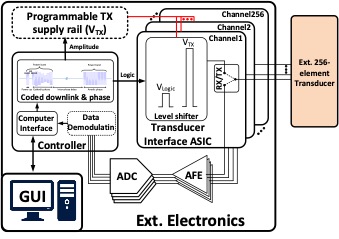MSc thesis project proposal
[2022] External electronics for ultrasonically powered stimulators
During the past decade, Ultrasonic power links has attracted an increasing interest for powering active biomedical implants. High power intensity within safety limits (720 mW/cm2), Low attenuation by traveling through the tissue and mm-sized focusing possibility makes ultrasonic an attractive option in comparison with the conventional RF and near field counterparts. An ultrasonic power link is composed of an external device located outside the body, and one/multiple implant(s). The external device is responsible for transmitting the forward power and configuration data to the implant(s), receiving the uplink data from the implants and adjusting the link based on the received data. A proper design of the external device, is crucial for the link management in terms of efficiency and functionality. The main objectives of this project are proposing, implementation and test of a link management strategy for the application of ultrasonically powered stimulator(s).
Assignment
- Literature review on ultrasonically powered systems and neural stimulator;
- Proposing a Link management strategy (messages, timings, and protocol) for ultrasonically powered neural stimulators, considering the bandwidth and safety limits.
- Implementing the closed loop electronics for the proposed scheme in the external side.
- driving the external transducers for power and data transmission,
- Receiving the uplink data and analysing them
- Make a proof-of-concept benchtop prototype and testing it with a mimicking ultrasonic setup
Requirements
The ideal candidate has the below attributes:
- Eager to do lab experiments and familiar with FPGA programming, PCB design, and prototype development
- Familiar with basics wireless data modulation techniques
- last but not least, curious and self-motivated
Interested students should contact Dr. Vasiliki Giagka (v.giagka@tudelft.nl) and Dr. Amin Rashidi (Amin.Rashidi@tudelft.nl) by sending an email expressing their interest in the project. The email should also contain the following: CV, list of courses you have attended so far and grades obtained, courses you are planning to take in the future, and more importantly a motivation letter explaining why you are interested in the project.
Contact
dr. Vasiliki Giagka
Bioelectronics Group
Department of Microelectronics
Last modified: 2025-02-13
